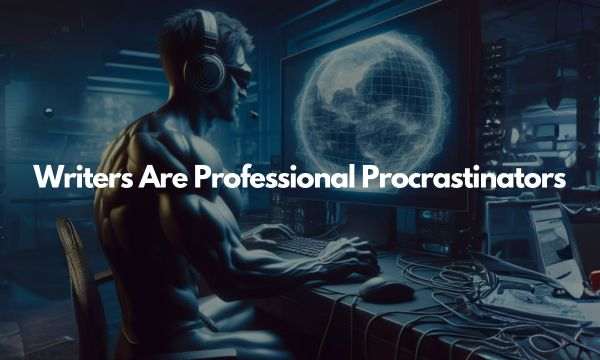Creative writing is a divisive topic—some people love it, others roll their eyes. To some, it’s the art of weaving tales; to others, it’s an overhyped exercise in self-indulgence. But what if we say creative writing is rubbish? Let’s poke at this idea with some wacky theories, playful critiques, and a few practical insights.

Words Are Overrated
People say words are powerful, but are they really? We throw them around daily, yet misunderstandings run rampant, and meanings often get lost in translation. Creative writing thrives on the illusion that words can build entire worlds, but this is just fancy window dressing. Perhaps we’re fooling ourselves into thinking words hold more weight than they actually do.
- Writing complex descriptions often creates confusion. A single metaphor can derail a reader’s focus, making them picture something entirely unintended. For instance, comparing clouds to "melancholy cotton candy" makes people question your sanity instead of your imagery.
- Overusing adjectives tends to dilute meaning. Describing every object with flowery language turns a story into a thesaurus exercise. A chair described as "verdant, luminous, and evocative" makes readers doubt its existence.
- Dialogue written to sound realistic can feel robotic. Mimicking real-life speech too closely leaves conversations dull and repetitive. Readers start asking, "Why is everyone saying 'um' every five seconds?"
- Wordplay often overshadows the actual plot. Clever puns or acrostics might amuse the writer but distract from storytelling. Your detective novel shouldn’t hinge on an anagram of "cheese."
How much is too much when it comes to descriptive language? Does wordplay enhance or derail the storytelling process?
Plots Are Just Recycled Nonsense
Every plot has been done before, so why bother? Creative writing often tries to disguise this recycling by dressing old plots in shiny new outfits. But readers eventually catch on to the sameness lurking underneath. Originality, some would argue, is nothing more than a myth.
- Twists are rarely surprising anymore. Readers have seen the "it was all a dream" ending so many times they’ve become immune to its impact. It’s like trying to scare someone with a fake spider for the 100th time.
- Love triangles follow the same tired formulas. Two characters fight over a third, usually with predictable outcomes. Swap out the setting and names, and it’s the same story every time.
- Heroic quests always hit identical beats. A chosen one, a mentor, and an ancient evil—rinse and repeat. Throwing in a dragon doesn’t make it fresh.
- "Deep" stories often rely on forced ambiguity. Writers who want to seem intellectual leave endings open, making readers do all the work. "What do YOU think it means?" is often code for "I didn’t know how to finish."
Are original plots even possible anymore? How does predictability affect your enjoyment of a story?

Writers Are Professional Procrastinators
Writing is mostly staring at a blank page and finding creative ways to avoid filling it. Writers love to glamorize their struggles, but at its core, creative writing is often just fancy procrastination. Why write when you can invent reasons to delay?
- Research becomes an endless rabbit hole. Writers claim they’re "building authenticity" but end up watching unrelated YouTube videos. Searching for "historical shoe designs" spirals into cat meme compilations.
- Rewriting the same sentence repeatedly is a classic stall tactic. Changing "She walked swiftly" to "She strode purposefully" and back again kills time but adds no value. It’s just mental busywork.
- Writers create elaborate rituals to delay starting. "I can’t write until my coffee is brewed, my pencils are sharpened, and Mercury is no longer in retrograde." The ritual becomes the task.
- Planning too much often means writing nothing. Spending hours designing character arcs or drawing maps leaves no energy for actual prose. These "preparations" usually gather dust.
How often do rituals and research become excuses? Is procrastination a part of the creative process or just an obstacle?
Readers Are Unreasonably Demanding
Creative writing suffers under the weight of unreasonable reader expectations. Everyone has an opinion about how stories should be told, but you can’t please everyone. Writing to satisfy readers often feels like trying to herd cats.
- Readers expect originality while demanding familiarity. They want new ideas but complain if stories don’t follow conventions. Breaking stereotypes often leads to cries of "This doesn’t feel right."
- Plot holes are scrutinized beyond reason. A minor inconsistency, like a character wearing the wrong socks, sparks online debates. Writers end up answering questions about sock continuity instead of themes.
- Pacing is always too fast or too slow. Some readers complain if the plot moves at lightning speed; others whine if it takes time to build. Finding a middle ground is a losing battle.
- Endings are never satisfactory for everyone. Tie everything up, and readers complain it’s "too neat." Leave things ambiguous, and they demand explanations. Writers can only shrug.
What’s the most unreasonable reader complaint you’ve encountered? Should writers cater to expectations or follow their instincts?
The Rules Are Made to Be Broken
Creative writing often teaches rules that are promptly broken. The supposed "rules of writing" act more as guidelines for criticism than actual necessities. Breaking rules has become more of a game than a rebellion.
- Show, don’t tell, is frequently ignored. Writers are told to let actions speak louder than descriptions but often fall back on exposition. Telling readers "John was angry" is faster than describing his twitching eyebrow.
- Passive voice is regularly overused despite the warnings. Writers cling to "mistakes were made" phrasing because it sounds fancy. It’s the linguistic equivalent of sweeping things under the rug.
- Prologues are frowned upon but used anyway. Readers skip them, and critics hate them, yet writers keep adding them. It’s the "fruitcake" of storytelling traditions.
- Breaking the fourth wall annoys some but delights others. Talking directly to the reader feels edgy but risks pulling them out of the story. It’s a gamble that often confuses more than it entertains.
Are rules in creative writing useful or restrictive? How do broken rules affect your reading experience?
What Do You Advocate?
Characters Are Ridiculous Creations
Characters are supposedly the heart of any story, but let’s face it—they’re often ridiculous. Writers craft exaggerated personas that would never survive in the real world. These exaggerated personalities often undermine the believability of a narrative.
- Heroes are unrealistically flawless. They make impossible decisions under pressure without batting an eye. No one in real life has perfect hair while saving the world.
- Villains are cartoonishly evil. They have no motivation other than destruction and laughter in dark lairs. Few people cackle in real life, yet villains apparently do it all the time.
- Side characters serve no purpose beyond helping the plot. Their entire existence revolves around giving the hero advice or conveniently dying. They’re essentially living plot devices.
- Dialogue often sounds like it came from a bad movie. Characters speak in ways no human ever would, using lines like "This isn’t just a fight; it’s personal." Writers forget that real people don’t narrate their feelings.
Do exaggerated characters make stories fun or frustrating? How realistic should fictional characters aim to be?
Creative Writing Is Rubbish
After dissecting creative writing’s flaws, it’s hard to see it as anything but overhyped rubbish. Words are weak, plots are recycled, and characters are absurd caricatures. Writing rules serve more to frustrate than guide, and readers’ demands are impossible to satisfy. Perhaps creative writing survives because, despite everything, we enjoy the chaos of its failures.
